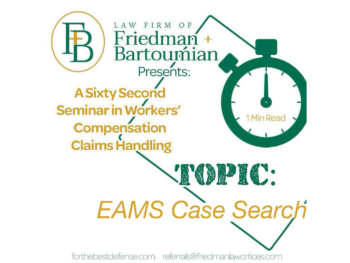The other day a client mentioned to us that they received an RFA from a physician requesting that an emotional support animal be provided to an injured worker. We promptly undertook a search for controlling appellate caselaw and/or other relevant legal authority which would shed light on the employer’s obligation when faced with such a request. The purpose of today’s blog is to discuss the compensability issues raised by an RFA of this nature.
Preliminarily, let’s get our nomenclature straight. There are important distinctions between a “service” animal and an “emotional support” animal. The definitions are as follows:
a. A service animal is defined under Title II and Title III of ADA as any animal that is individually trained to do work or perform tasks for the benefit of an individual with a disability, including a physical, sensory, psychiatric, intellectual, or other mental disability. Tasks performed can include, among other things, pulling a wheelchair, retrieving dropped items, or alerting a person to a sound. A service animal prescribed by a psychiatrist for a psychiatric condition is defined as an animal that has been trained to perform tasks that assist individuals with disabilities to detect the onset of psychiatric episodes and lessen their effects. Tasks performed by psychiatric service animals may include reminding the handler to take medicine, providing safety checks or room searches, interrupting self-mutilation by persons with dissociative identity disorders, and keeping disoriented individuals from danger.
b. An emotional support animal is not considered a service animal under Title II and Title III of the ADA. Various species of support animals, whether wild or domestic, trained, or untrained, are not considered service animals. It does not matter if there is a note from a doctor stating the patient has a disability requiring an animal for emotional support. A doctor’s note does not turn an emotional support animal into a service animal.
We can certainly understand the compensability of a service animal (such as a guide dog for the blind) but it’s more difficult to comprehend how an emotional support animal can be compensable under workers’ compensation law. Also, the type of emotional support animal in question is equally important as people have been known to declare a strange array of pets to be emotional support animals, including reptiles, snakes, pigs, and even an alligator. In that regard, we can’t fathom seeing a work comp judge ordering an employer to purchase a snake or an alligator for an injured worker.
By far, the most common service and emotional support animals are dogs, which are subject to two supplemental definitions:
- Service Dog – A dog trained to perform tasks for an individual with a disability. It is illegal to exclude such animals from entrance to stores, public buildings, airlines, taxis, etc. A “service dog” would probably be compensable under work comp. Such dogs are usually identified by the blue scarf which their owners dress them in.
- Emotional Support Dog – A medically prescribed animal providing therapeutic benefit through dedicated companionship. Although airlines, landlords and educational facilities may request a medical note, admittance is not required by law. An “emotional support dog” would probably also be non-compensable under work comp. Such dogs are usually identified by the red scarf they are dressed in.
Compensability here is often highly fact intensive. Should you have any questions about this issue, please feel free to contact the experts here at Friedman + Bartoumian.



Leave a Reply